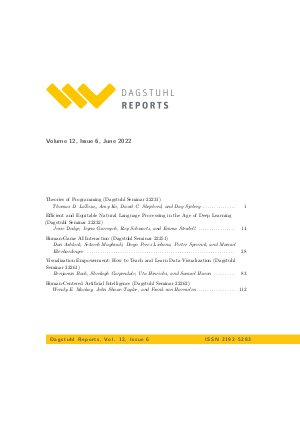Dagstuhl Reports, Volume 12, Issue 6
-
Part of:
Volume:
Dagstuhl Reports, Volume 12
Journal: Dagstuhl Reports (DagRep)

Event
- Dagstuhl Seminars 22231, 22232, 22251, 22261, 22262
Publication Details
- published at: 2023-01-19
- Publisher: Schloss Dagstuhl – Leibniz-Zentrum für Informatik
- DBLP: db/journals/dagstuhl-reports/dagstuhl-reports12
Access Numbers
- Detailed Access Statistics available here
-
Total Document Accesses (updated on a weekly basis):
0PDF Downloads
Documents
Dagstuhl Reports, Volume 12, Issue 6, June 2022, Complete Issue
Abstract
Cite as
Dagstuhl Reports, Volume 12, Issue 6, pp. 1-119, Schloss Dagstuhl – Leibniz-Zentrum für Informatik (2023)
Copy BibTex To Clipboard
@Article{DagRep.12.6,
title = {{Dagstuhl Reports, Volume 12, Issue 6, June 2022, Complete Issue}},
pages = {1--119},
journal = {Dagstuhl Reports},
ISSN = {2192-5283},
year = {2023},
volume = {12},
number = {6},
publisher = {Schloss Dagstuhl -- Leibniz-Zentrum f{\"u}r Informatik},
address = {Dagstuhl, Germany},
URL = {https://drops.dagstuhl.de/entities/document/10.4230/DagRep.12.6},
URN = {urn:nbn:de:0030-drops-174512},
doi = {10.4230/DagRep.12.6},
annote = {Keywords: Dagstuhl Reports, Volume 12, Issue 6, June 2019, Complete Issue}
}
Dagstuhl Reports, Table of Contents, Volume 12, Issue 6, 2022
Abstract
Cite as
Dagstuhl Reports, Volume 12, Issue 6, pp. i-ii, Schloss Dagstuhl – Leibniz-Zentrum für Informatik (2023)
Copy BibTex To Clipboard
@Article{DagRep.12.6.i,
title = {{Dagstuhl Reports, Table of Contents, Volume 12, Issue 6, 2022}},
pages = {i--ii},
journal = {Dagstuhl Reports},
ISSN = {2192-5283},
year = {2023},
volume = {12},
number = {6},
publisher = {Schloss Dagstuhl -- Leibniz-Zentrum f{\"u}r Informatik},
address = {Dagstuhl, Germany},
URL = {https://drops.dagstuhl.de/entities/document/10.4230/DagRep.12.6.i},
URN = {urn:nbn:de:0030-drops-174526},
doi = {10.4230/DagRep.12.6.i},
annote = {Keywords: Table of Contents, Frontmatter}
}
Theories of Programming (Dagstuhl Seminar 22231)
Abstract
Cite as
Thomas D. LaToza, Amy Ko, David C. Shepherd, Dag Sjøberg, and Benjamin Xie. Theories of Programming (Dagstuhl Seminar 22231). In Dagstuhl Reports, Volume 12, Issue 6, pp. 1-13, Schloss Dagstuhl – Leibniz-Zentrum für Informatik (2023)
Copy BibTex To Clipboard
@Article{latoza_et_al:DagRep.12.6.1,
author = {LaToza, Thomas D. and Ko, Amy and Shepherd, David C. and Sj{\o}berg, Dag and Xie, Benjamin},
title = {{Theories of Programming (Dagstuhl Seminar 22231)}},
pages = {1--13},
journal = {Dagstuhl Reports},
ISSN = {2192-5283},
year = {2023},
volume = {12},
number = {6},
editor = {LaToza, Thomas D. and Ko, Amy and Shepherd, David C. and Sj{\o}berg, Dag and Xie, Benjamin},
publisher = {Schloss Dagstuhl -- Leibniz-Zentrum f{\"u}r Informatik},
address = {Dagstuhl, Germany},
URL = {https://drops.dagstuhl.de/entities/document/10.4230/DagRep.12.6.1},
URN = {urn:nbn:de:0030-drops-174533},
doi = {10.4230/DagRep.12.6.1},
annote = {Keywords: computing education, human-computer interaction, programming languages, software engineering, theories of programming}
}
Efficient and Equitable Natural Language Processing in the Age of Deep Learning (Dagstuhl Seminar 22232)
Abstract
Cite as
Jesse Dodge, Iryna Gurevych, Roy Schwartz, Emma Strubell, and Betty van Aken. Efficient and Equitable Natural Language Processing in the Age of Deep Learning (Dagstuhl Seminar 22232). In Dagstuhl Reports, Volume 12, Issue 6, pp. 14-27, Schloss Dagstuhl – Leibniz-Zentrum für Informatik (2023)
Copy BibTex To Clipboard
@Article{dodge_et_al:DagRep.12.6.14,
author = {Dodge, Jesse and Gurevych, Iryna and Schwartz, Roy and Strubell, Emma and van Aken, Betty},
title = {{Efficient and Equitable Natural Language Processing in the Age of Deep Learning (Dagstuhl Seminar 22232)}},
pages = {14--27},
journal = {Dagstuhl Reports},
ISSN = {2192-5283},
year = {2023},
volume = {12},
number = {6},
editor = {Dodge, Jesse and Gurevych, Iryna and Schwartz, Roy and Strubell, Emma and van Aken, Betty},
publisher = {Schloss Dagstuhl -- Leibniz-Zentrum f{\"u}r Informatik},
address = {Dagstuhl, Germany},
URL = {https://drops.dagstuhl.de/entities/document/10.4230/DagRep.12.6.14},
URN = {urn:nbn:de:0030-drops-174549},
doi = {10.4230/DagRep.12.6.14},
annote = {Keywords: deep learning, efficiency, equity, natural language processing (nlp)}
}
Human-Game AI Interaction (Dagstuhl Seminar 22251)
Abstract
Cite as
Dan Ashlock, Setareh Maghsudi, Diego Perez Liebana, Pieter Spronck, and Manuel Eberhardinger. Human-Game AI Interaction (Dagstuhl Seminar 22251). In Dagstuhl Reports, Volume 12, Issue 6, pp. 28-82, Schloss Dagstuhl – Leibniz-Zentrum für Informatik (2023)
Copy BibTex To Clipboard
@Article{ashlock_et_al:DagRep.12.6.28,
author = {Ashlock, Dan and Maghsudi, Setareh and Liebana, Diego Perez and Spronck, Pieter and Eberhardinger, Manuel},
title = {{Human-Game AI Interaction (Dagstuhl Seminar 22251)}},
pages = {28--82},
journal = {Dagstuhl Reports},
ISSN = {2192-5283},
year = {2023},
volume = {12},
number = {6},
editor = {Ashlock, Dan and Maghsudi, Setareh and Liebana, Diego Perez and Spronck, Pieter and Eberhardinger, Manuel},
publisher = {Schloss Dagstuhl -- Leibniz-Zentrum f{\"u}r Informatik},
address = {Dagstuhl, Germany},
URL = {https://drops.dagstuhl.de/entities/document/10.4230/DagRep.12.6.28},
URN = {urn:nbn:de:0030-drops-174550},
doi = {10.4230/DagRep.12.6.28},
annote = {Keywords: Computational intelligence, artificial intelligence, games, modeling, interaction}
}
Visualization Empowerment: How to Teach and Learn Data Visualization (Dagstuhl Seminar 22261)
Abstract
Cite as
Benjamin Bach, Sheelagh Carpendale, Uta Hinrichs, and Samuel Huron. Visualization Empowerment: How to Teach and Learn Data Visualization (Dagstuhl Seminar 22261). In Dagstuhl Reports, Volume 12, Issue 6, pp. 83-111, Schloss Dagstuhl – Leibniz-Zentrum für Informatik (2023)
Copy BibTex To Clipboard
@Article{bach_et_al:DagRep.12.6.83,
author = {Bach, Benjamin and Carpendale, Sheelagh and Hinrichs, Uta and Huron, Samuel},
title = {{Visualization Empowerment: How to Teach and Learn Data Visualization (Dagstuhl Seminar 22261)}},
pages = {83--111},
journal = {Dagstuhl Reports},
ISSN = {2192-5283},
year = {2023},
volume = {12},
number = {6},
editor = {Bach, Benjamin and Carpendale, Sheelagh and Hinrichs, Uta and Huron, Samuel},
publisher = {Schloss Dagstuhl -- Leibniz-Zentrum f{\"u}r Informatik},
address = {Dagstuhl, Germany},
URL = {https://drops.dagstuhl.de/entities/document/10.4230/DagRep.12.6.83},
URN = {urn:nbn:de:0030-drops-174568},
doi = {10.4230/DagRep.12.6.83},
annote = {Keywords: Information Visualization, Visualization Literacy, Data Literacy, Education}
}
Human-Centered Artificial Intelligence (Dagstuhl Seminar 22262)
Abstract
Cite as
Wendy E. Mackay, John Shawe-Taylor, and Frank van Harmelen. Human-Centered Artificial Intelligence (Dagstuhl Seminar 22262). In Dagstuhl Reports, Volume 12, Issue 6, pp. 112-117, Schloss Dagstuhl – Leibniz-Zentrum für Informatik (2023)
Copy BibTex To Clipboard
@Article{mackay_et_al:DagRep.12.6.112,
author = {Mackay, Wendy E. and Shawe-Taylor, John and van Harmelen, Frank},
title = {{Human-Centered Artificial Intelligence (Dagstuhl Seminar 22262)}},
pages = {112--117},
journal = {Dagstuhl Reports},
ISSN = {2192-5283},
year = {2023},
volume = {12},
number = {6},
editor = {Mackay, Wendy E. and Shawe-Taylor, John and van Harmelen, Frank},
publisher = {Schloss Dagstuhl -- Leibniz-Zentrum f{\"u}r Informatik},
address = {Dagstuhl, Germany},
URL = {https://drops.dagstuhl.de/entities/document/10.4230/DagRep.12.6.112},
URN = {urn:nbn:de:0030-drops-174579},
doi = {10.4230/DagRep.12.6.112},
annote = {Keywords: Human-centered Artificial Intelligence, Human-Computer Interaction, Hybrid Intelligence}
}